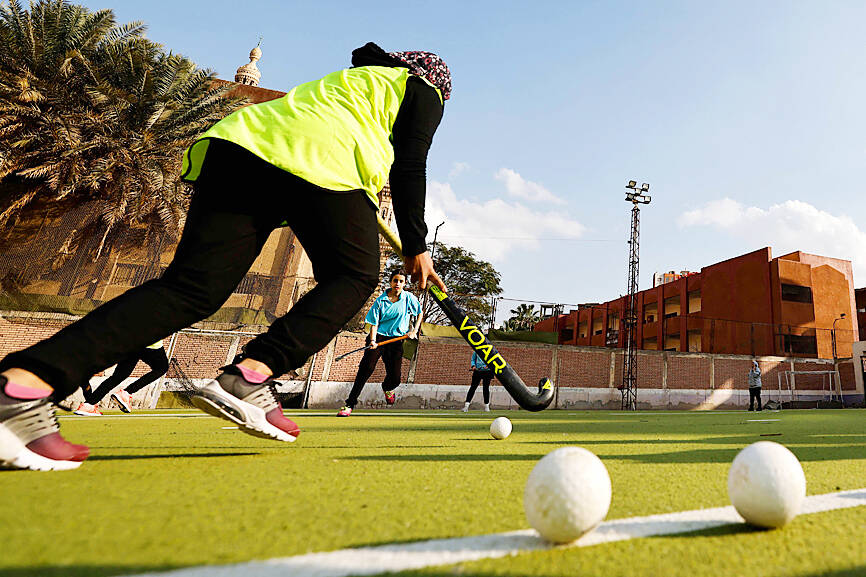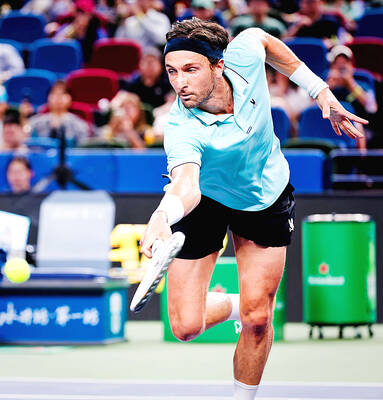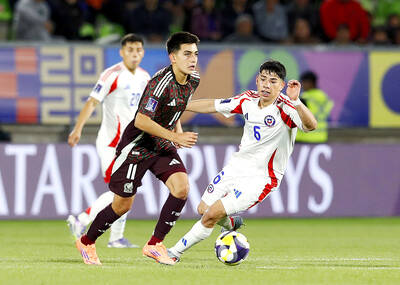Egypt’s fertile Nile Delta might not be the obvious destination for field hockey, but a women’s team is blazing a trail in a region that lays claim to the sport’s ancient roots.
While hockey is unlikely to ever sell out stadiums in soccer-mad Egypt, 24-year-old forward Donia Shaarawy said the governorate of Sharqiya has become the country’s hockey hub, and a potential launchpad for her dreams of going pro.
“Hockey means Sharqiya, that’s how we grew up,” she said, hopping off the practice field clad in a black jersey and matching hijab.

Photo: AFP
Women first took to the field in the region 100km north of Cairo in 1995, 30 years after the first men’s team was established.
However, the region’s love for the sport goes back to Ancient Egyptian times, when a similar game was played with a stick made of palm fronds, Sharqiya Hockey Club supervisor Ibrahim al-Bagoury said.
“It was known to them as hoksha, and it was played in ancient cities such as Tel Basta” — in what is modern-day Sharqiya — as well as Amarna, al-Bagoury said.
Thousands of years later, the athletes of the Sharqiya women’s team — which has won 25 out of 28 league tournaments in its history — dribble across the field to the sound of wooden hockey sticks colliding.
The Sharqiya team is the most decorated in Egypt, winning five out of seven national championships and taking the Africa Cup for Club Champions in 2019.
Coach Mostafa Khalil said that despite having “no media support,” clubs in Italy and France have offered contracts to four members of his team, all of whom turned them down.
One of the players could not quit her studies, while the others were unable to accept the offers because they were married with children.
For team captain Nahla Ahmed, 28, marriage and children have been no object.
“I’m married, I have a daughter and my husband plays hockey himself,” she said.
She said that “going pro in Egypt would be easier for women” than going abroad, as teams would be more likely to accommodate the athletes’ family commitments.
Ahmed, who has played hockey for 18 years and was crowned the Egyptian hockey league’s best player last season, has a bigger dream — “to become the best player in Africa.”
Although the women of Sharqiya have proven themselves time and again, they have come up against stubborn social norms and punishing economic woes.
“It’s an expensive sport, and without media coverage, we don’t get sponsors,” Khalil said.
It was only in 2019 that an Egyptian company sponsored the team, when Egypt hosted the Africa Cup for Club Champions, he said.
One imported hockey stick costs upward of US$120, while a goalie’s kit can set the team back US$2,100 — a steep cost in a country where the local currency is on a downward spiral.
There is little room for maneuvering given the Sharqiya club’s annual field hockey budget of 5 million to 6 million Egyptian pounds (US$161,562 to US$193,874), club president Hamdy Marzouk said.
Yet he remains unphased, vowing instead to “preserve this bastion ... [and] keep the game here.”
“With over 150 national and continental championship wins, we can’t throw that away,” he said. “It’s like samba and football in Brazil — everyone in Sharqiya has a hockey stick.”

Jesper Boqvist on Tuesday scored the go-ahead goal midway through the third period as the Florida Panthers, after raising their second straight NHL Stanley Cup banner, opened the defense of the title by beating the Chicago Blackhawks 3-2. Mackie Samoskevich — getting his second assist, the fifth two-point game of his career — chipped the puck toward the goal and Boqvist knocked it out of the air for the lead with 10 minutes, 20 seconds left. A.J. Greer and Carter Verhaeghe also had goals for Florida, who got 17 saves from Sergei Bobrovsky. Frank Nazar had a goal and an assist and Teuvo

World No. 3 Alexander Zverev on Monday said that he was playing “terrible tennis” after he was knocked out of the Shanghai Masters by France’s Arthur Rinderknech 4-6, 6-3, 6-2. His exit leaves Novak Djokovic as the tournament’s top-ranked player, increasing the 38-year-old Serb’s chances of winning a record-extending fifth title in the Chinese financial hub. In stifling conditions, world No. 54 Rinderknech came back from a set down to stun an increasingly rattled Zverev into submission. It is the second time the Frenchman has beaten him, after bundling him out of Wimbledon earlier this year. A despondent Zverev told reporters the match had

Mexico’s teenage playmaker Gilberto Mora has lit up the FIFA U-20 World Cup in Chile as he basks in the limelight afforded by the absences of Barcelona and Real Madrid stars Lamine Yamal and Franco Mastantuono. “I don’t know if I’m the biggest star, and I’m not really interested in that. I think you can always give more,” 16-year-old Mora said before Mexico’s 4-1 win against host nation Chile in the round-of-16 on Tuesday, in which he provided the assist for the opening goal. Next on Mora’s schedule is a quarter-final clash against Argentina this morning Taiwan time, but after

‘SOMETHING SPECIAL’: Nathan Lukes hit a two-run single and Addison Barger had three of Toronto’s 12 hits as the Blue Jays bounced back After taking down the storied New York Yankees in their own ballpark in their American League Division Series on Wednesday, Toronto Blue Jays manager John Schneider was ready to revel in the triumph. “Start spreading the news,” Schneider said while popping a bottle of bubbly to set off the Blue Jays’ jubilant celebration inside their Yankee Stadium clubhouse. With the party under way, the familiar lyrics from Frank Sinatra’s version of New York, New York — the Yankees’ long-time victory anthem — sounded in the background as roaring Toronto players sprayed each other with booze in the Bronx. This time, it was their